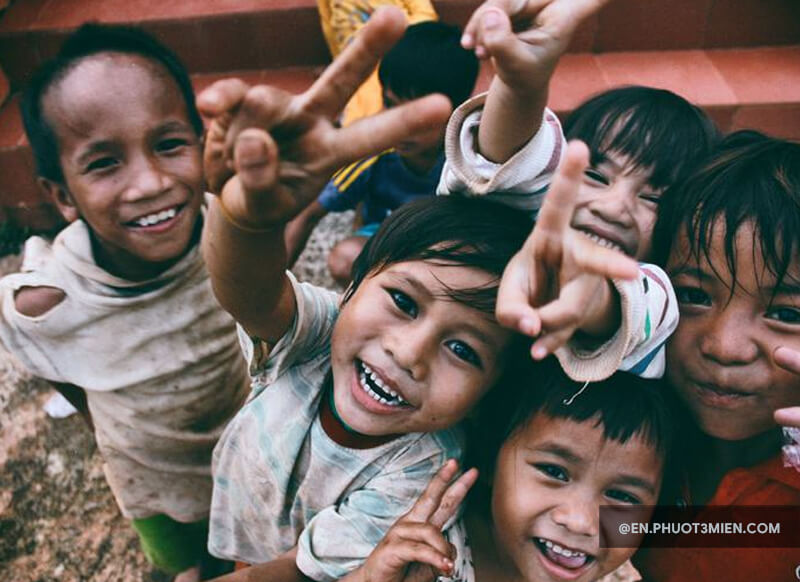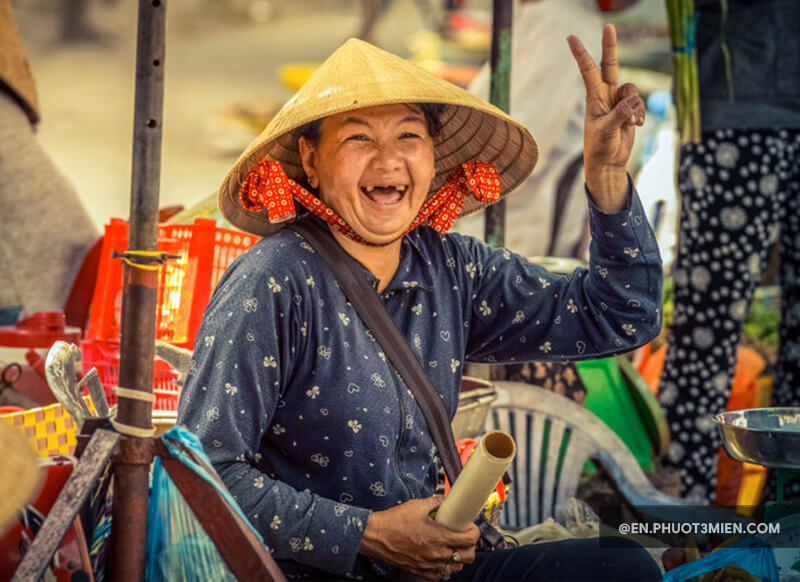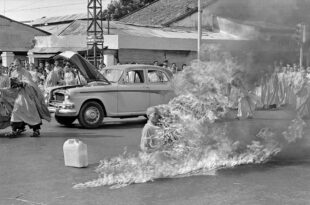Before we get deep into gestures, you should first realize that Vietnamese society follows an age hierarchy. Therefore, when you communicate with the elderly, you ought to show your respect. When talking to someone younger than you are, you should express your love and generosity, but it is fine to be strict once in a while. When speaking to someone of the same age, don’t forget that in Vietnamese society, while having adopted a lot of the Western lifestyle, respects the collectivism. Therefore, whenever showing your disagreement, you should present your ideas in a soft and fun attitude. Opposing directly is not recommended.
In this article, we are going to scan through some very basic but important gestures that you should know when you travel to Vietnam, or when you visit a Vietnamese friend’s house.
Saying Hello/ Goodbye
- Fingers make a “V” shape: Like most, we interpret “V” to mean victory. However, V also means two (two fingers), and in Vietnamese, the number two is pronounced “hai”, similar to saying hi in English. So when you meet a local person (usually someone who cannot speak English well) and see them putting their fingers in a V shape to you, they are saying “hi”. If that V shape appears when people are taking a photo, it means “victory”.
- Nodding head: When you meet someone younger than you are, it is fine to nod your head, showing them that you acknowledge their presence. Nodding your head should usually be accompanied by a smile. Notice: do not nod your head to say hello to an elderly person.
- Waving your hand: When you want to say hello/ goodbye to your friends in a friendly way, waving your hand (or even your arm) is recommended.
- Bowing your body: This gesture is particularly suitable when you say hello/ goodbye to an elderly person, showing your respect to them. You need not bow your body too low, a 30 degree angle is good. Your arms need not to be straight along your body the way the Japanese bow when greeting. And, you should actively greet the elder instead of letting them greet you first. Do not say hello from too far a distance. Wait until they are five meters from you, then bow your body.
When You Visit a House
- Take your shoes off: It is disrespectful if a person enters a Vietnamese house and does not take their shoes off, because this signals that you do not have respect for the house’s cleanliness. If the host wears slippers and if there are spare pairs for guests, they will let you know.
- Take your hat off: It is considered rude if you talk to an elderly person while still wearing a hat. There are two exceptions to the rule. If you know this person very well or when you are staying outdoors with aggressive sunshine, you do not have to remove your hat.
- Be on time, or five minutes late: If you have an appointment to visit a house, you really should be on time. But if you can’t, being up to five minutes late is fine. If you will be way later, you should inform the host.
- Always greet the oldest one first: What if the whole family wants to welcome you, including your friend’s grandpa? You can have a friendly hug with your friend, but it is way more important that you have a proper greeting (usually bowing your body as mentioned above) to the elder first.
- Gift: A small gift is recommended. This gift is usually for either the oldest person or the children in the house. For example, if you visit your friend’s house and the friend stays with her parents, you should not bring her a gift while having nothing for her parents. But that is totally fine if you have nothing for her but a bag of fruit for her mother!
- Don’t sit higher than the elders, don’t cross your legs if you sit with older family members: In Vietnam, you only cross your legs if you are sitting with friends or sometimes with your partner, displaying your confidence. When you sit with the elderly, showing respect is more important than self-confidence.
- Ask about their family: People in Vietnam consider family the most important part in their life. Hence, if you ask about their family in a way that lets them feel you really care about their family members, they’ll appreciate you a lot.
- For females: If you visit a house and stay for lunch, you should offer help with preparing the meal. They may not let you help, but they will surely appreciate you a lot more if you offer!
- What if their house just had a funeral less than a year ago? We usually ask the host if we can give an incense stick to the deceased, before having a chat with the people in the house.
- Don’t offer a handshake to the elders: Younger people either ask for permission or obey the elders. With this in mind, don’t shake hands with your elders. Even though shaking hands show friendliness, more often the elders offer a handshake to the younger members first. Small tip: a man should let the lady offer a handshake first!

Showing Your Appreciation
- Using both hands when receiving or giving something: This is a typical gesture to show that you really respect the other person. It is quite a must when you receive or give something to someone older. What about when you sell something to your customers or receive money from the cashier? Well, traditionally, we use both hands, too.
Showing Your Agreement
- Clapping your hands: When you attend a conference/ meeting. This shows that you agree with what is being said.
- Nodding your head: This gesture is not appropriate when you speak to someone older than you are.
- Bowing your head a wee bit when saying yes: This sign shows people that you respect and agree with their idea, it is most used when you speak to elders.
Showing Friendliness
- Shaking hands: As in many other regions, shaking hands shows people your cooperative intention. Use this when you are conducting business, or ending the first conversation with someone you just met. Again, the “elders rule” is applied, you should let the older person offer a handshake first.
- High five: This gesture is common among the young generation.
- Hugging: A hug displays friendliness more than any gesture. Traditionally it is only popular among long-time-no-see Vietnamese men. To the millennials, this limit no longer exists. Yet, it is still something parents may find inappropriate.
Showing Disagreement
- Shaking your head: In Vietnam and most other places, shaking your head means disagreement. However, when talking to the elderly, we don’t shake our head, but politely explain why we don’t agree with them.
- Waving hand: When you disagree with someone’s idea, you can softly wave your hand, smile and say no. It shows your disagreement in quite a polite way, which can be used when talking to the elderly.
Inappropriate Gestures
- Winking: In most situations, this attitude shows others that you are not telling the truth, or you are hiding something. If the action is between a man and a woman, this means they are in an unclear relationship.
- Hugging a person of the opposite sex: It is still not appropriate for a woman to hug a man in Vietnam if they are not in a relationship. While that etiquette is not too strict nowadays among younger generations, parents do not like seeing their daughters hugging male friends.
- Placing your hands in your trouser pockets while talking: This behavior shows the other person that you look down on them.
- Pointing to other people with your cursor or middle finger: We only point at a direction or a thing, not a human.
- Directing your feet to face somebody: Sometimes you will see a man sitting with one leg over the other, making his foot face somebody’s eyes. Other times you may see a person lying down, their feet facing directly toward somebody. This action is not appropriate among intellectuals.
- Hold your hand up and twisting it back and forth: This action has two meanings: either to call a person coming to you, or to ask a person to leave. In case you want to call a child, you can do this with a smile, but never call an adult this way. In case you want to ask someone to leave, you should not use this action, unless you are so tired with that person and don’t want to talk anymore.
We have just gone through some very basic Vietnamese gestures – being familiar with these will do you a big favor if you are in Vietnam. Feel free to ask more questions in the comments below. If you are interested in Vietnamese culture, check out more articles on our Travel Blog Phuot3mien !
You may want to follow up with:
Guide to Vietnamese Traditional Costumes










